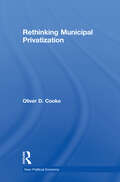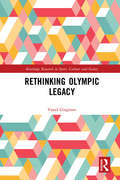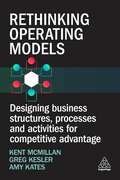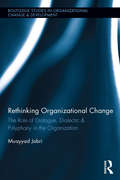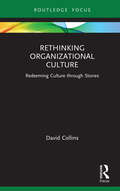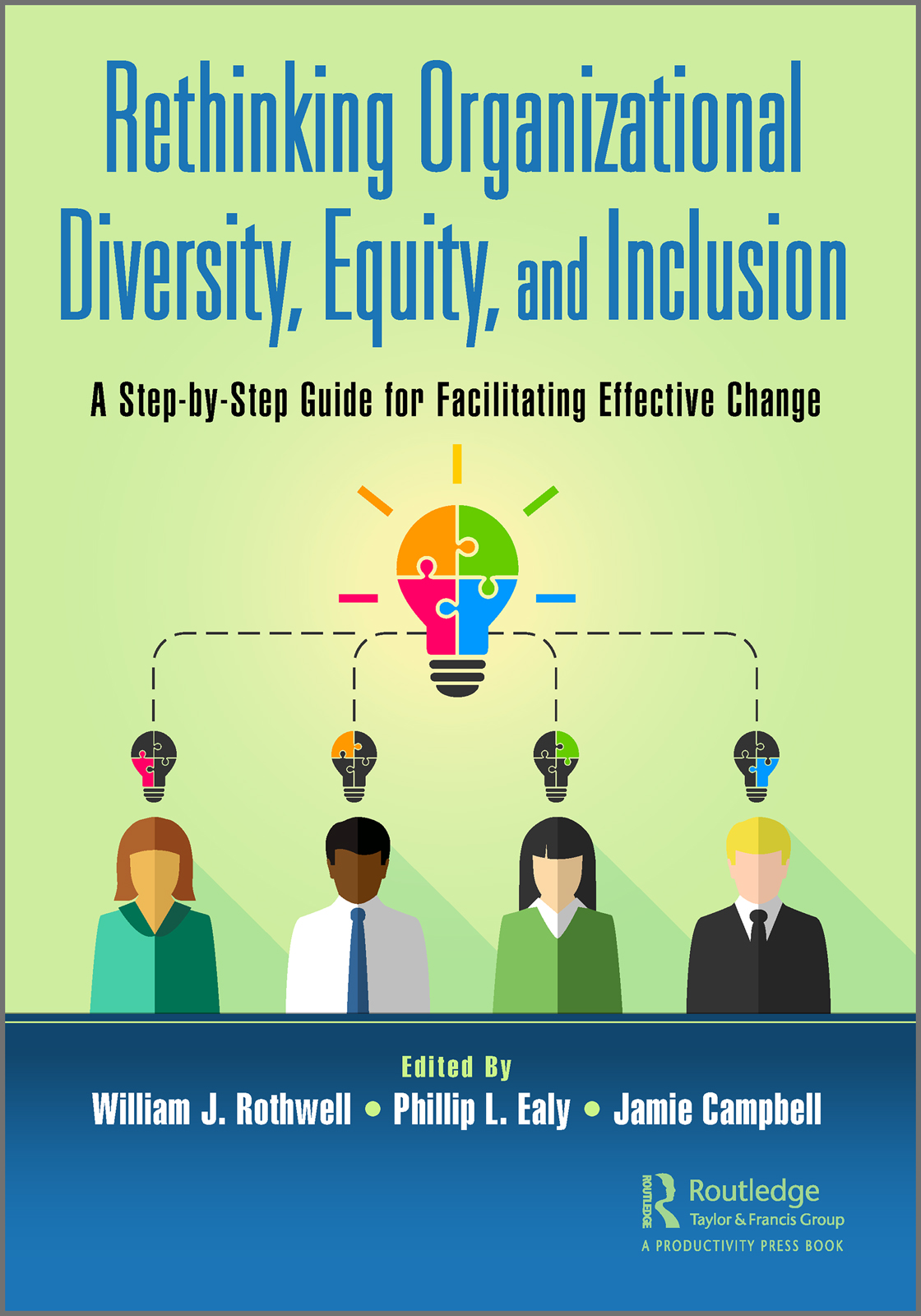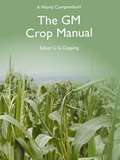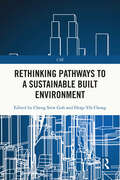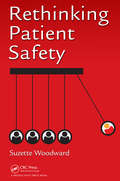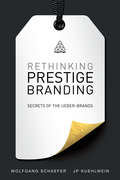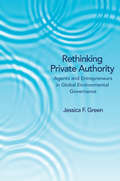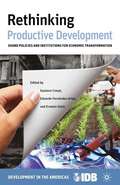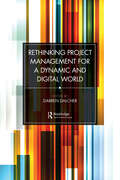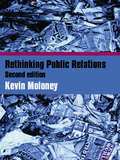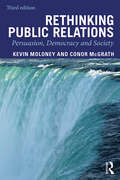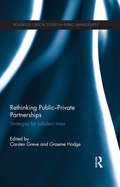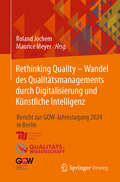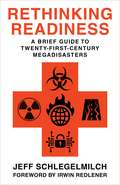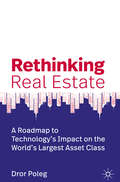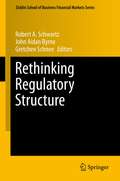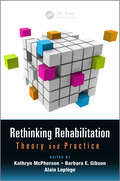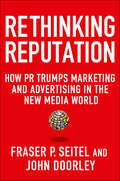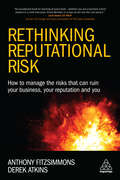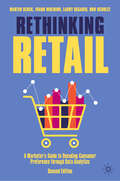- Table View
- List View
Rethinking Municipal Privatization (New Political Economy Ser.)
by Oliver D. CookeThis book examines one of the most high-profile municipal privatizations the privatization of New York City‘s Central Park. The fiscal crisis of the 1970s established the political and cultural opening for privatizations, which were justified on the basis of increasing efficiency. However, as Cooke demonstrates, these justifications were deliberate
Rethinking Olympic Legacy (Routledge Research in Sport, Culture and Society)
by Vassil GirginovHow do Olympic legacies come about? This book offers an alternative approach to the study of Olympic and mega-sport event legacy, challenging how legacy is conceptualised and practised. It shifts the focus from legacy as a retrospective concept concerned with what has been left behind after the Games, to a prospective one interested in actions and interactions stimulated by the Games. The book argues that creating Olympic legacy is a continuing four-stage process involving ‘investing’ (the accumulated common Olympic cultural capital), ‘interpelling’ (forming a trusteeship relationship where one party undertakes to change the capacity of another), ‘developing’ (ensuring participation in interactions and resource development) and ‘codifying’ (documenting, sharing and remembering legacies so they become cultural capital). It presents a developmental approach to the Olympics which involves vision, trustees and trusteeship and is concerned with capacity building at individual, organisational and societal levels. Thinking of Olympic legacy as capacity building allows seeing the goal of legacy as an embodiment of the aspirations of the Olympic Movement and the Games to introduce radical change in society by transforming its structure. Rethinking Olympic Legacy is essential reading for all students and scholars within an interest in the Olympics, as well as for administrators, policymakers and planners involved with mega-sport events.
Rethinking Operating Models: Designing People and Technology Powered Organizations
by Kent McMillan, Greg Kesler, Amy KatesDespite the economic expansion driven by technological advances and AI, businesses today are facing mounting challenges. Providing practical frameworks and tools to design organizations that meet ambitious growth, profitability and sustainability goals, Rethinking Operating Models is a must-read for senior business leaders and organization design and development professionals who are looking to adapt their operating model to meet the most persistent and pressing business questions. It allows practitioners to design models that will fuel growth and innovation, can transform through the changing pace of data and technology developments and achieve agility at scale. This book also provides essential coverage of how to execute mergers, acquisitions and divestments, how to manage complexity and cost as well as how to embed responsibility and sustainability into the organization. Written by a team of experts and supported by proven methodologies and real-world examples, this book provides readers with the ability to tailor solutions to their own unique contexts.
Rethinking Organizational Change: The Role of Dialogue, Dialectic & Polyphony in the Organization (Routledge Studies in Organizational Change & Development #14)
by Muayyad JabriRethinking Organizational Change: The Role of Dialogue, Dialectic & Polyphony in the Organization makes an important scholarly contribution to our understanding of dialogue applied to the management of change. Muayyad Jabri offers an involved assessment of the differences between 'dialogue’ and ‘dialectic’ and an intriguing invitation to rely on both for managing creative interventions into the change process. The book provides a surplus of new insights that will help to promote scholarly work in the area of managing change and to develop a more creative practice associated with the processes of managing change. The call for polyphony facilitates a crossover from sameness to diversity and from univocal to multivocal representations. In reading patterns of managing change, whether from within or across organizational borders, it is found that a vital part of the reading is, at present, ‘unreadable’ because we lack involved knowledge of how diversity and polyphony are interrelated. This book seeks to change this; based on a rendition of Mikhail Bakhtin’s anthropological concept of polyphony applied to organizational change. The reader is treated to a cutting-edge discussion of a variety of contemporary ontological and epistemological themes centered on process, dialectic, dialogue and social construction.
Rethinking Organizational Culture: Redeeming Culture through Stories (Routledge Focus on Business and Management)
by David CollinsWhat is organizational culture? Why does it matter? This book demonstrates that conventional wisdom on this fundamental business topic has surpassed its usefulness. The author wants neither to praise scholarship on culture nor to bury it – rather he wants to build something fit for purpose by reflecting on the power of stories and storytelling. Rethinking Organizational Culture argues that that the entrenched models of organizational culture wrench thinking, feeling, and action from a context that intuition warns us are complex and problematic. Arguing that novels and novelists offer an opportunity to redeem ‘organizational culture’, the text invites readers to recognise that stories of organization offer connections with organizational profanity, organized polyphony, and the organizationally prosaic. A stimulating and provocative read, this book will be welcomed by students, scholars, and reflective practitioners across the business field.
Rethinking Organizational Diversity, Equity, and Inclusion: A Step-by-Step Guide for Facilitating Effective Change
by William J. Rothwell, Phillip L. Ealy, and Jamie CampbellResearch has shown that having a diverse organization only improves and enhances businesses. Forbes and Time report that diversity is an $8 Billion a year investment. However, poorly implementing diversity programs have damaging effects on the organization and the very individuals these programs attempt to help. Poorly implemented programs can cause peers and subordinates to question decisions and lose faith in leadership. In addition, it can cause even the most confident individuals to doubt their own skillset and qualifications. Many organizations have turned to training to solve this complex issue. Yet still, other organizations have created and filled diversity and inclusion positions to tackle the issue. The effects of these poorly implemented programs are highlighted during strenuous times such as the latest COVID-19 pandemic. Marginalized people are more marginalized, and resources and support do not reach everyone. Tasks such as providing technical support, conducting large group meetings, or distributing work obligations without seeing employees on a daily basis becomes more challenging. Complex problems cannot be solved with simple solutions. Using organization development (OD) to develop a comprehensive change initiative can help. This book outlines how properly conducting an OD change initiative can effectively increase an organization’s diversity and inclusion -- it is grounded in research-based literature on diversity and OD principles. Many organizational leaders realize the key importance of diversity, equity, inclusion and multiculturalism in modern organizations. It is only through such efforts can organizations thrive in a networked world where much work is done virtually—and often across borders. But a common scenario is that leaders, recognizing the need for a diversity program, will pick someone from the organization to launch it. Perhaps the person identified for this challenge is in the HR department but has had no experience in launching diversity efforts—or even in managing large-scale, long-term, organization wide change efforts. But these are the challenges to be faced. This book quickly identifies some reasons why diversity programs fail and how to avoid those failures. The majority of the book highlights how to use OD to improve organization culture and processes to not only increase diversity and inclusion but develop overall organization talent and prevent personal preferences and biases from hindering the selection of the best talent for positions.
Rethinking Park Protection
by Will LapageIn today's society, hidden beliefs can subtly guide the management of parks, such as treating them as natural resources rather than national assets. Resulting management practices often lead to deferred maintenance on park infrastructure, causing inadequate protection from vandalism, poaching, and theft of artefacts. A sad demise, often due to an out-dated belief that parks are non-essential leisure services rather than necessities for a vibrant modern life. This book challenges the reader to examine the core beliefs that created our public parklands, comparing them with the beliefs that guide contemporary park stewardship in an effort to improve the management of parks and reassess their purpose in modern life.
Rethinking Pathways to a Sustainable Built Environment (CIB)
by Cheng Siew Goh Heap-Yih ChongThis book aims to provide insights into rethinking pathways in the transition to sustainable built environments in the wake of the pandemic and COP26. It examines our abilities and capabilities to leverage resources to the best use for achieving the universal sustainable development goals. The goal is to identify fresh thinking to make the goals of sustainable built environment more achievable, particularly to align with the national and international targets set by COP26. The book will help address the need for mainstreaming sustainability into the core of decision making of buildings and infrastructure projects throughout the life cycle from planning, to design, construction and operation. This book consolidates a comprehensive body of knowledge of sustainable development that will equip industry professionals, educators, scholars, and students with knowledge and skills to deliver sustainability practice within the built environment. Through theoretical underpinning and presentation of best practices, the book offers solutions to advance the development of sustainability practices in the context of the built environment. The book covers the following content: Sharing of best practice and case studies Review of Sustainability Contemporary Practices in the Built Environment Innovative Net Zero/ Carbon neutral solutions and strategies Sustainable building assessment and certification systems Key Sustainability Deliverables in the Built Environment Social Transition towards Sustainability The book will be of value to interested scholars and practitioners who are involved in sustainable design and engineering practice within the built environment.
Rethinking Patient Safety
by Suzette WoodwardThe vast majority of healthcare is provided safely and effectively. However, just like any high-risk industry, things can and do go wrong. There is a world of advice about how to keep people safe but this delivers little in terms of changed practice. Written by a leading expert in the field with over two decades of experience, Rethinking Patient Safety provides readers with a critical reflection upon what it might take to narrow the implementation gap between the evidence base about patient safety and actual practice. This book provides important examples for the many professionals who work in patient safety but are struggling to narrow the gap and make a difference in their current situation. It provides insights on practical actions that can be immediately implemented to improve the safety of patient care in healthcare and provides readers with a different way of thinking in terms of changing behavior and practices as well as processes and systems. Suzette Woodward shares lessons from the science of implementation, campaigning and social movement methods and offers the reader the story of a discovery. Her team has explored an approach which could profoundly affect the safety culture in healthcare; a methodology to help people talk to each other and their patients and to listen through facilitated safety conversations. This is their story.
Rethinking Peacekeeping, Gender Equality and Collective Security
by Gina Heathcote Dianne OttoThis book examines how the Security Council has approached issues of gender equality since 2000. Written by academics, activists and practitioners the book challenges the reader to consider how women's participation, gender equality, sexual violence and the prevalence of economic disadvantages might be addressed in post-conflict communities.
Rethinking Prestige Branding
by Wolfgang Schaefer Jp KuehlweinWhat makes someone covet a Kelly bag? Why are Cirque Du Soleil or Grey Goose so successful despite breaking all the conventions of their categories? What does Gucci's approach to marketing have in common with Nespresso's? And why do some people pay a relative fortune for Renova toilet paper or Aesop detergent even though they hardly ever 'advertise' and seem to have none of the 'functional performance advantages' conventional marketers would seek to demonstrate? Prestige brand experts JP Kuehlwein and Wolfgang Schaefer have dedicated themselves to studying what drives the success of prestige brands. Rethinking Prestige Branding collects their insights. Uncovering the secrets of why and how some brands are created more equal than others, Rethinking Prestige Branding includes over 100 case studies from Apple and Abercrombie & Fitch to Tate Modern and Tesla. Rather than re-telling brand success stories or re-hashing long-standing marketing principles, it takes readers on a colourful journey behind the scenes of today's marketing pros. This book will fascinate the marketing professional just as much as those who are simply curious as to how premium brands tick.
Rethinking Private Authority: Agents and Entrepreneurs in Global Environmental Governance
by Jessica F. GreenRethinking Private Authority examines the role of non-state actors in global environmental politics, arguing that a fuller understanding of their role requires a new way of conceptualizing private authority. Jessica Green identifies two distinct forms of private authority--one in which states delegate authority to private actors, and another in which entrepreneurial actors generate their own rules, persuading others to adopt them. Drawing on a wealth of empirical evidence spanning a century of environmental rule making, Green shows how the delegation of authority to private actors has played a small but consistent role in multilateral environmental agreements over the past fifty years, largely in the area of treaty implementation. This contrasts with entrepreneurial authority, where most private environmental rules have been created in the past two decades. Green traces how this dynamic and fast-growing form of private authority is becoming increasingly common in areas ranging from organic food to green building practices to sustainable tourism. She persuasively argues that the configuration of state preferences and the existing institutional landscape are paramount to explaining why private authority emerges and assumes the form that it does. In-depth cases on climate change provide evidence for her arguments. Groundbreaking in scope, Rethinking Private Authority demonstrates that authority in world politics is diffused across multiple levels and diverse actors, and it offers a more complete picture of how private actors are helping to shape our response to today's most pressing environmental problems.
Rethinking Productive Development
by Gustavo Crespi Ernesto Stein Eduardo Fernández-AriasRethinking Productive Development systematically analyzes policies in key areas such as innovation, new firms, firm networks, financing, human capital, and internationalization.
Rethinking Project Management for a Dynamic and Digital World
by Darren DalcherAlthough project management is a newly recognised profession, it deals with a number of significant challenges. We seem to operate in an unprecedented environment, rife with change, innovation and turbulence. Moreover, projects by their very nature tend to push boundaries, encourage novelty and demand engagement with the uncertain and the unknown. Indeed, projects reflect our organised impulse to constantly amend, shape, improve and refine our context. So how can future projects overcome the challenges? Rethinking Project Management for a Dynamic and Digital World makes a powerful and original statement equipping project leaders and managers with new approaches and frameworks for an increasingly demanding world where the traditional methods, models and mindsets no longer suffice. The book explores new trends, promising ideas and novel concepts and distils the fundamentals for marshalling a world concerned with people, communities and value by deploying innovation, rethinking purpose and acting responsibly. An increasingly borderless, upwardly mobile and entrepreneurial society requires a revamped and revitalised project perspective that is more dynamic, adaptive and reflective. This volume brings together some of the best writing by leading authorities on many key topics, including benchmarking, lean quality, communicating, teams and teamwork, followership, organising for project work, project frameworks, agile working, project portfolios, strategic initiatives, strategic alignment, trust, entrepreneurship, putting people first, social processes, positive organisations, rethinking progress, the hacker paradigm, community, stewardship and knowledge management. The collection thus offers an invaluable new resource for informed managers looking to engage with the latest thinking and research and for researchers seeking to reflect on how the discipline is changing.
Rethinking Public Relations: PR Propaganda and Democracy
by Kevin MoloneyAll PR, whether for charities or arms manufacturers, is weak propaganda. Though it has its undeniable benefits (it grabs attention and helps circulate more information), it also has costs (such as selective messaging). This extensively revised edition of a classic text fully investigates PR, updating and expanding earlier arguments and building upon the successful first edition with new thoughts, data and evidence. Thought-provoking and stimulating, Rethinking Public Relations 2nd Edition challenges conventional PR wisdom. It develops the accepted thinking on the most important question facing PR - its relationship with democracy - and finds a balance of advantages and disadvantages which leave a residue of concern. It tackles topical issues such as: PR as a form of propaganda which flourishes in a democracy the connections between PR and journalism the media, promotions culture and persuasion. Designed to appeal to final year undergraduates, postgraduates and researchers studying public relations, media and communications studies, this book explores the most important relationship PR has – the connection with democracy – and asks what benefits or costs it brings to politics, markets and the media.
Rethinking Public Relations: Persuasion, Democracy and Society
by Kevin Moloney Conor McGrathThis new (third) edition of Rethinking Public Relations continues the argument of previous editions that public relations is weak propaganda. However, while earlier editions focused on PR as representative of the uneven power distribution in society, this book goes further, conceiving the power of PR as more than just structural but also as having an important rhetorical component. In this extensively revised edition, Moloney and McGrath dissect the nature of the modern PR industry, arguing that its idealised self-presentation should be replaced by a more realistic and credible defence of the societal value produced by advocacy and counter-advocacy. This book includes expanded coverage of PR’s impact on society (through areas such as CSR, sponsorship and community relations), its relationship with stakeholders, and its role in democratic debate and public policy making. It also considers the ways in which journalism has capitulated to PR in an era of ‘fake news’ and ‘churnalism’ and, in this new edition, the role of digital and social media is examined for the first time. Maintaining the rigorous and critical stance of previous editions, this new edition will also prove accessible to Master’s level and final-year undergraduate students studying public relations, media and communications studies. Additionally, it will be of great value to practitioners who seek to widen PR’s ‘voices’.
Rethinking Public-Private Partnerships: Strategies for Turbulent Times (Routledge Critical Studies in Public Management)
by Carsten Greve Graeme HodgeThe global financial crisis hit the world in a remarkable way in late 2008. Many governments and private sector organizations, who had considered Public-Private Partnerships (PPPs) to be their future, were forced to rethink their strategy in the wake of the crisis, as a lot of the available private funding upon which PPPs relied, was suddenly no longer available to the same extent. At the same time, governments and international organizations, like the European Union, were striving to make closer partnerships between the public sector and the private sector economy a hallmark for future policy initiatives. This book examines PPPs in the context of turbulent times following the global financial crisis (GFC). PPPs can come in many forms, and the book sets out to distinguish between the many alternative views of partnerships; a project, a policy, a symbol of the role of the private sector in a mixed economy, or a governance tool - all within a particular cultural and historical context. This book is about rethinking PPPs in the wake of the financial crisis and aims to give a clearer picture of the kind of conceptual frameworks that researchers might employ to now study PPPs. The crisis took much of the glamour out of PPPs, but theoretical advances have been made by researchers in a number of areas and this book examines selected new research approaches to the study of PPPs.
Rethinking Quality - Wandel des Qualitätsmanagements durch Digitalisierung und Künstliche Intelligenz: Bericht zur GQW-Jahrestagung 2024 in Berlin
by Roland Jochem Maurice MeyerIn einer Zeit des technologischen Fortschritts, globaler Krisen sowie sich verändernder Kundenerwartungen muss Qualität neu gedacht werden. Das traditionelle Qualitätsmanagement, welches jahrzehntelang auf bewährten Prozessen und Methoden basierte, unterliegt einer fundamentalen Transformation. Der alleinige Fokus auf Produkte ist längst unzureichend, um die Vielfältigkeit des Qualitätsmanagements in Unternehmen abzubilden. Vielmehr muss Qualität ganzheitlich im Wertschöpfungsnetzwerk verankert werden. Zentraler Treiber der Vernetzung ist die umfassende Digitalisierung der industriellen Produktion mit ihrer zunehmenden Datenverfügbarkeit über die verschiedenen Wertschöpfungsstufen und Lebenszyklusphasen hinweg. In diesem Zusammenhang eröffnet Künstliche Intelligenz völlig neue Möglichkeiten, die Art und Weise, wie Qualität gemessen, überwacht und verbessert wird, zu revolutionieren. Der Wandel des Qualitätsmanagements durch Digitalisierung und Künstliche Intelligenz geht jedoch über die bloße Implementierung neuer Technologien hinaus. Digitalisierung, Datenanalytik und Künstliche Intelligenz erweitern die Potenziale des Qualitätsmanagers und erfordern die umfassende Entwicklung neuer Kompetenzen. Alles in allem bedarf es daher neuer Leitbilder, Strategien und Abläufe im Qualitätsmanagement, um auch in Zukunft erfolgreich und wettbewerbsfähig zu bleiben. Als Tagungsband zur Jahrestagung der Gesellschaft für Qualitätswissenschaft e.V. (GQW) im Oktober 2024 in Berlin fokussiert dieses Buch unter dem Motto „Rethinking Quality“ die Diskussion wesentlicher Themen und Aufgaben, um das Qualitätswesen zukunftsfähig zu machen. Der Schwerpunkt liegt auf der Auseinandersetzung mit aktuellen Handlungsfeldern, Trends sowie Entwicklungen im Qualitätsmanagement rund um Digitalisierung und Künstliche Intelligenz. Enthalten sind alle im Rahmen der Tagung eingereichten, vorgestellten und positiv begutachteten Beiträge, sodass ein breites Spektrum an neuen Erkenntnissen und Best Practices abgedeckt wird.
Rethinking Readiness: A Brief Guide to Twenty-First-Century Megadisasters
by Professor Jeffrey SchlegelmilchAs human society continues to develop, we have increased the risk of large-scale disasters. From health care to infrastructure to national security, systems designed to keep us safe have also heightened the potential for catastrophe. The constant pressure of climate change, geopolitical conflict, and our tendency to ignore what is hard to grasp exacerbates potential dangers. How can we prepare for and prevent the twenty-first-century disasters on the horizon?Rethinking Readiness offers an expert introduction to human-made threats and vulnerabilities, with a focus on opportunities to reimagine how we approach disaster preparedness. Jeff Schlegelmilch identifies and explores the most critical threats facing the world today, detailing the dangers of pandemics, climate change, infrastructure collapse, cyberattacks, and nuclear conflict. Drawing on the latest research from leading experts, he provides an accessible overview of the causes and potential effects of these looming megadisasters. The book highlights the potential for building resilient, adaptable, and sustainable systems so that we can be better prepared to respond to and recover from future crises. Thoroughly grounded in scientific and policy expertise, Rethinking Readiness is an essential guide to this century’s biggest challenges in disaster management.
Rethinking Real Estate: A Roadmap to Technology’s Impact on the World’s Largest Asset Class
by Dror PolegTechnology is revolutionizing the way real estate is designed, operated, and valued. It is democratizing access to capital and information, changing the way tenants use space, and eroding the power of regulation. Billions of dollars are funding these new real estate technologies and operating models. Value is shifting away from the assets themselves toward those who understand the needs of specific end-users and can use technology to deliver comprehensive, on-demand solutions. With all of these developments, there is an urgent need for a resource that helps industry practitioners think differently about their investment, customers, and competition.Rethinking Real Estate answers that call. It explores the impact of technology on all asset types — from retail projects, through lodging and residential properties, to office buildings and industrial facilities. Based on the author’s two decades of experience working across four continents alongside the world’s leading real estate investors, as well as hundreds of conversations with start-up founders and venture capitalists, this book provides practitioners with key insights, methodologies, and practical strategies to identify risks, take advantage of emerging opportunities, evaluate new competitors, and transform their organization, project, venture, or career. Whether you are an investor, developer, operator, broker, lender, facility manager, designer, planner, or technology entrepreneur, this book will help you navigate the exciting period ahead.
Rethinking Regulatory Structure
by Robert A. Schwartz John Aidan Byrne Gretchen SchneeThree dominant forces worldwide are driving change today in our financial markets: competition, technology and regulation. But their collective impact in reshaping the markets, though they may be viewed individually as desirable or well-intentioned, is producing challenging results that are difficult to predict, hard to control and not easy to understand. Extreme market turbulence has underlined the key issues as much attention turns to the appropriate regulatory response. That is the backdrop for this thought-provoking book, emerging from a Baruch College Conference on equity market structure in the aftermath of the global financial crisis, and featuring contributions from an acclaimed panel of international scholars, policymakers, regulators, and industry leaders. The result presents emerging perspective and ideas that illuminate the dynamics of financial regulation today and into the future. The Zicklin School of Business Financial Markets Series presents the insights emerging from a sequence of conferences hosted by the Zicklin School at Baruch College for industry professionals, regulators, and scholars. Much more than historical documents, the transcripts from the conferences are edited for clarity, perspective and context; material and comments from subsequent interviews with the panelists and speakers are integrated for a complete thematic presentation. Each book is focused on a well delineated topic, but all deliver broader insights into the quality and efficiency of the U.S. equity markets and the dynamic forces changing them.
Rethinking Rehabilitation: Theory and Practice (Rehabilitation Science in Practice Series)
by Kathryn McPherson Barbara E. Gibson Alain LeplègeThis book informs readers about how leading researchers are rethinking rehabilitation research and practice. It emphasizes discussion on the place of theory in advancing rehabilitation knowledge, unearthing important questions for policy and practice, underpinning research design, and prompting readers to question clinical assumptions. Each author proposes ways of thinking that are informed by theory, philosophy, and/or history as well as empirical research. Rigorous and provocative, it presents chapters that model ways readers might advance their own thinking, learning, practice, and research.
Rethinking Reputation: How PR Trumps Marketing and Advertising in the New Media World
by Fraser P. Seitel John DoorleyWhy PR is more important than advertising or marketing - and how to harness its power to get new customers and protect your reputation in today's media-saturated world.Good public relations is no longer just icing--it's a strategic imperative more important to your competitive success than even advertising or marketing. This is true whether you're a century-old multibillion-dollar corporation or a penniless startup. In Rethinking Reputation, public relations guru Fraser Seitel and John Doorley, founder of the Academy for Communication Excellence and Leadership at Johnson & Johnson, examine a fascinating set of case studies--including the BP oil spill and the launch of CitySlips--to glean the PR dos and don'ts for the new media world, covering both standard reputation maintenance and crisis management. They also show start-up companies and entrenched organizations how to use the power of word-of-mouth to jump-start business like never before. This is a wake-up call from two industry legends-for public relations professionals as well as entrepreneurs, CEOs, and anyone else tasked with representing their organization to the world. These new media lessons include: * Remember that research is cheaper, and more critical, than ever. * Don't let the perfect be the enemy of the good--launch your idea before someone else does. * Don't get so excited about social media that you forget about traditional media. * In a crisis, you are never offstage. * Never lie, never whine, and never try to predict the future!
Rethinking Reputational Risk: How to Manage the Risks that can Ruin Your Business, Your Reputation and You
by Anthony Fitzsimmons Prof Derek AtkinsA company's reputation is one of its most valuable assets, and reputational risk is high on the agenda at board level and amongst regulators. Rethinking Reputational Risk explains the hidden factors which can both cause crises and tip an otherwise survivable crisis into a reputational disaster, using case studies such as BP's Deepwater Horizon oil spill, Volkswagen's emissions rigging scandal, Tesco, AIG, EADS Airbus A380, and Mid-Staffordshire NHS Hospital Trust. Reputations are lost when the perception of an organization is damaged by its behaviour not meeting stakeholder expectations. Rethinking Reputational Risk lays bare the actions, inactions and local 'states of normality' that can lead to perception-changing consequences and gives readers the insight to recognize and respond to the risks to their reputations. Through case studies and analysis of failures, this hard-hitting guide also applies lessons drawn from behavioural economics to the behavioural risks that underlie reputation risk. An essential read for risk professionals, business leaders and board members who need to understand and deal with business-critical threats to their reputation, this book presents a new framework that will be invaluable for all involved in safeguarding an organization's reputation.
Rethinking Retail: A Marketer’s Guide to Decoding Consumer Preference through Data Analytics
by Martin Block Don Schultz Larry DeGaris Frank MulhernRetailing has changed rapidly in recent years with the pandemic accelerating the long-term growth of e-commerce. Drawing on a unique data set drawn from hundreds of thousands of interviews over almost two decades, this book takes a close look at changes in consumers&’ shopping preferences, behaviors, and influences. Across a range of topics, the authors argue that the rise of e-commerce has coincided with a decline in consumer preferences—what people buy and where they buy it. This presents challenges for both retailers and manufacturers. The authors propose that the answer lies with consumers. A focus on consumers is fundamental to designing effective marketing strategies and campaigns. However, retailers and brands often have different perspectives about consumers. This book bridges that gap. The broad scope of topics and longitudinal data give retailers and brand marketers a roadmap for building and maintaining consumer preference in a rapidly changing and challenging environment.
